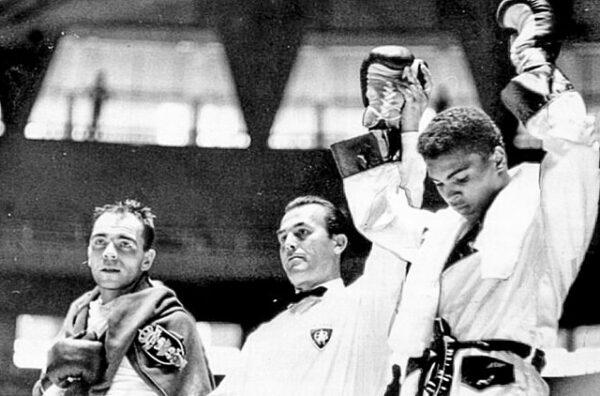On a warm Roman evening inside the Palazzo dello Sport, a tall, brash, and quick-footed 18-year-old from Louisville, Kentucky, danced his way into history. Cassius Marcellus Clay Jr.—the world would later know him as Muhammad Ali—captured the light heavyweight gold medal at the Rome Olympics, defeating Poland’s Zbigniew Pietrzykowski in a unanimous decision. It was the moment that first projected him onto the global stage, years before his boastful prophecy that he was “the greatest” would be vindicated.
Clay’s victory was the culmination of a remarkable run through the tournament. His style was unlike anything the international judges had seen: not the flat-footed plodding that defined many amateur fighters, but a hybrid of grace and aggression. He moved lightly, almost disdainfully, with his hands low and his head high, flicking out jabs and combinations at odd angles. His opponents could not catch him; they chased shadows. In Rome, where classical statues loomed and Renaissance ideals of form still resonated, Clay looked as if he had been sculpted for motion.
The final itself was a study in contrasts. Pietrzykowski, a 25-year-old veteran of three Olympics and the reigning European champion, brought with him the weight of experience. He pressed forward relentlessly, seeking to trap the younger American against the ropes. Clay, taller and faster, circled, darted, and countered. The Pole landed heavy blows in the first round, but Clay’s speed told in the second and third, when his combinations found their mark. By the end, there was little doubt. The judges awarded Clay a unanimous decision, and the teenager from Kentucky raised his arms in triumph.
For the United States, still basking in Cold War rivalries where every athletic contest carried symbolic weight, Clay’s gold medal was more than just personal glory. In 1960, the Olympics served as a global showcase of national vitality. That an African American from the segregated South could emerge as a champion on Italian soil carried deep, if unspoken, political significance. At home, Jim Crow still ruled in Louisville; in Rome, Clay was celebrated as a representative of American excellence.
The victory also revealed the outlines of a persona that would dominate the next two decades of sport. Clay was not shy. He charmed reporters in Rome with boasts that, while playful, carried a hint of future prophecy. He declared himself destined for greatness, promised that he would soon conquer the professional ranks, and teased that no one could catch him in the ring. His teammates recalled his constant chatter, his refusal to be cowed by older fighters, and his relentless self-promotion. To some, it was arrogance; to others, charisma. To history, it was the first glimpse of Muhammad Ali.
Outside the ring, Clay’s Roman experience shaped him in subtler ways. He wandered the streets on a borrowed bicycle, visited the Colosseum, and absorbed the cosmopolitan atmosphere of an ancient city. He ate gelato, mingled with Italian fans, and witnessed the adulation of a public that treated Olympians like gladiators. The young boxer from Kentucky, who had scarcely left the South before, discovered that he could command attention anywhere in the world.
When he returned to Louisville, however, the contradictions of America intruded. Clay would later recall the sting of segregation, the reality that Olympic gold did not shield him from being refused service at a whites-only restaurant. That dissonance between international acclaim and domestic prejudice shaped his growing political consciousness and paved the way for the radical choices he would make in the 1960s—his conversion to Islam, his defiance of the Vietnam draft, and his insistence on linking sport to broader struggles for justice.
In Rome, though, all that lay in the future. On September 5, 1960, he was simply Cassius Clay, the exuberant teenager who had vanquished Europe’s finest and stood atop the Olympic podium as “The Star-Spangled Banner” played. With gold draped around his neck, he flashed a grin that radiated both relief and destiny.



